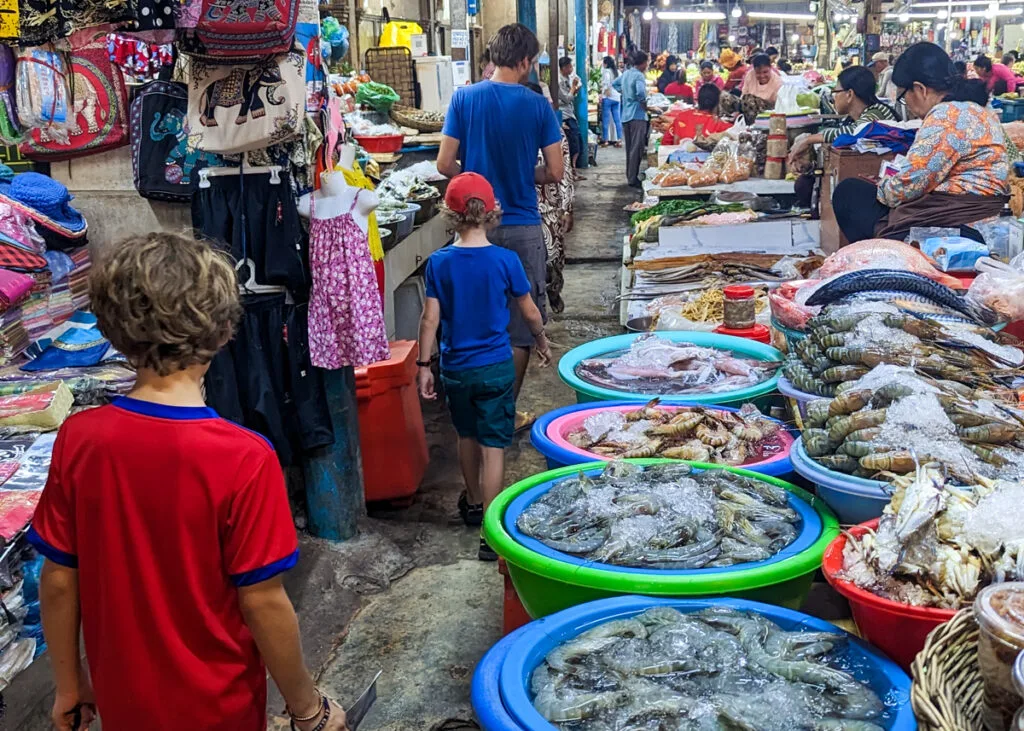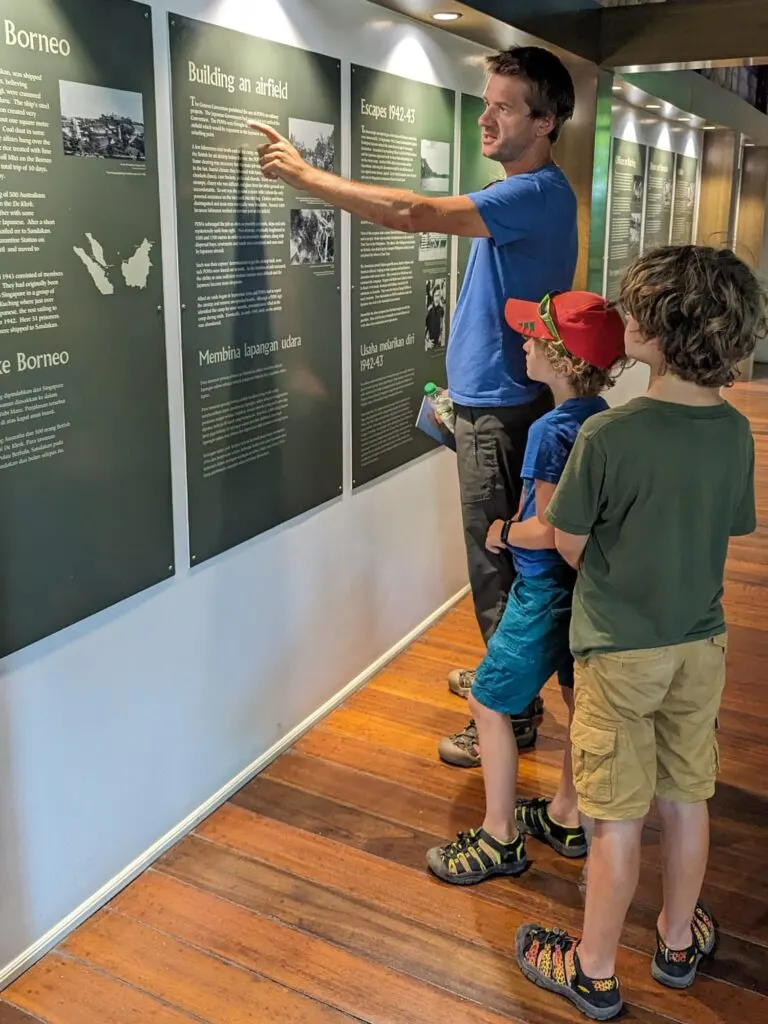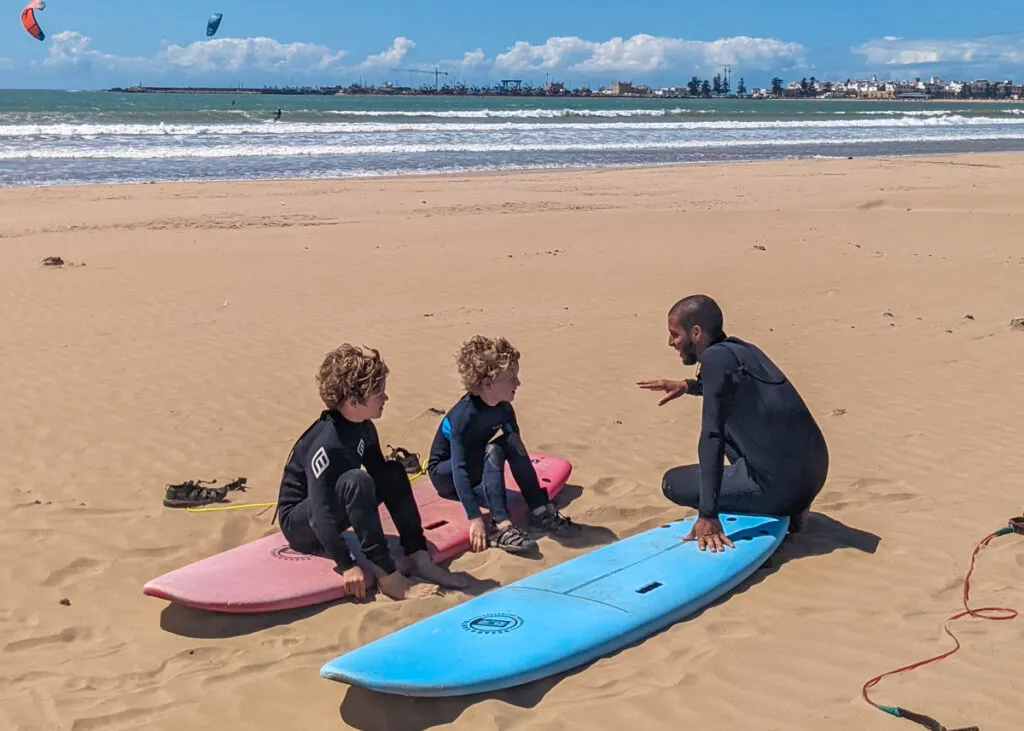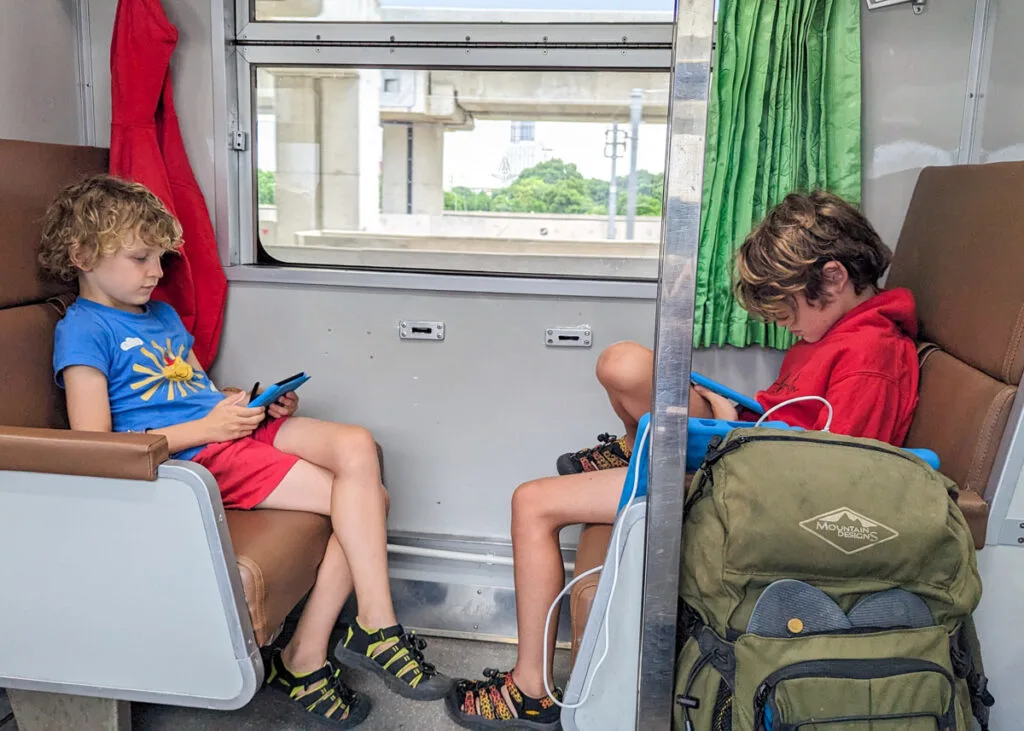“Not all classrooms have four walls” has to be a favourite family travel quote, and perfectly encapsulates the philosophy of worldschooling.
Worldschooling (aka world schooling) has become a recent buzzword as increasingly more families don the backpacks and head off on the open road with their kids in search of adventure.
But what is worldschooling? Do parents need to sign up somewhere? Is there a curriculum to follow? What does worldschooling actually involve and how do parents prepare for it?
We have worldschooled our kids since they were born and over recent years we have deregistered them from school to travel (including 4 months slow travelling Morocco and 10 weeks backpacking Southeast Asia). But we also rely on the stability, childcare, and community that regular school provides. We have a foot in both camps, as it so were, which means we can provide a balanced view on the pros and cons of worldschooling, as well as answer any questions regarding what worldschooling actually is.
After reading this article about worldschooling, you may want to check out our essential tips for worldschooling.
Disclaimer: This post contains affiliate links. If you click to purchase, it is at no additional cost to you, and I receive a small commission.
What is worldschooling?
Worldschooling is using the world as your classroom. Think of it as an extended field trip. Rather than learning through textbooks and screens from the confines of a classroom, kids are learning through the real life experiences that travel presents.
History lessons are a trip to the museum or a memorial site, geography lessons are walking around cities and villages, language lessons are ordering dinner in the local language and playing with local kids at a playground, religious education is visiting a temple or mosque, and PE can be a surf lesson or climbing a mountain.
Worldschooling is an immersive and alternative education, typically through long-term travel within culturally rich and divisive destinations, where kids have been taken out of the regular schooling environment.
But I don’t believe there has to be a minimum time to worldschooling. It’s just about getting out in the world, beyond the four walls of a classroom, and allowing the experiences to do the teaching. Worldschooling can be a trip to the zoo or local theatre, a litter-pick at your local beach or taking the bus to a new town. Although the further you step away from your home bubble, the broader the educational experience often becomes and hence why the term ‘worldschooling’ is associated with families who travel extensively overseas.
Can anyone worldschool?
Yes and no.
There is no curriculum to sign up to, no entry test. Worldschooling is a lifestyle choice that anyone can adopt if they want to.
Any limitations to worldschooling are typically with parents rather than children, as worldschooling requires certain a certain lifestyle.
Firstly you need the funds to be able to travel. Whilst slow, overseas travel can be cheaper than living in the UK (it’s something we’ve certainly experienced), the money needs to come from somewhere.
If parents have remote working, flexible jobs, then it’s doable (don’t forget the VPN for working overseas). Better if there’s a passive income. These are known as digital nomad families.
There are then those families who save hard, quit jobs, and hit the road, but there needs to be a plan for when the money dries up.
Unless you’ve won the lottery or inherit a large sum of money, a parent(s) career/job will determine whether worldschooling is possible. Indeed it’s the job, not necessarily the money, that’s the limitation.
Also, not all governments are open to worldschooling. Across Europe, worldschooling in the eyes of governments falls under the umbrella of ‘elective home education’ (aka homeschooling). In England this is legal and accepted, but it’s not straightforward in all countries. For instance, homeschooling is not explicitly recognised by Dutch law, and in Germany, homeschooling has been illegal since 1919.
Your child’s age is also something to consider as worldschooling is considered easier when children are younger, when the depth of subject curriculum is relatively light. Once kids enter secondary school, there’s a lot more to consider with regards providing an education, especially if they want to sit exams and work towards university.
But if you’re able and willing to jump through the hoops, then yes, you can worldschool!
Our experience of worldschooling
I would consider all travel we’ve done with the boys to be worldschooling. Whether its on an African safari, seeing a mother turtle laying eggs in Borneo, attending kids clubs on family campsites in France, temple hopping in Siem Reap, hiking in the Nepalese Himalayas, it all been a fantastic learning experience to broaden their education.
However, worldschooling is considered to be an alternative to regular education, and therefore implies that kids should not be in regular school. Within this bracket, our ‘worldschooling’ experiences are:
For both of these trips we de-registered our kids from school and then re-registered them on return to the UK. Click here to read more about that process.
These were fantastic experiences for all the family and the boys came on leaps and bounds through these trips. From learning to surf in Essaouria and taking a pottery class in Fes, to going on a river safari in Borneo and learning about the Khmer Rouge in Cambodia, they experienced an education that is just not possible in the classroom.

The boys were of primary school age for these trips, and to ensure they stayed on top of maths and English whilst we travelled, they undertook an hour of online learning per week, along with the DoodleLearning apps. Yes, that’s all they needed. That intense, 1:1 tailored learning each week kept them on track with the curriculum back in school, and arguably extended them further.
How is worldschooling different homeschooling?
Since the pandemic, many parents unfortunately have a negative view of homeschooling. This is understandable considering the circumstances. But homeschool in the pandemic is totally different to the true philosophy of homeschool.
Homeschooling isn’t about keeping a child at home. Homeschooled, or rather ‘home educated’ kids, are always out and about doing various activities and clubs. They are not learning in classrooms. They are learning out in the world, similar to worldschoolers.
So indeed, worldschooling and homeschooling definitely overlaps. However, homeschoolers tend to be based at home with activities closer to home, whereas worldschoolers are typically travelling long-term from place to place and structuring the learning around new destinations and cultures.
Isn’t worldschooling just travelling with kids?
Essentially yes. ‘Travel is the best education’.
But how you travel will affect how worthwhile the learning experience is. This is why worldschooling is often associated with those who go backpacking with kids, or take extended road trips in their camper or motorhome.

Immersing the family into a different culture, using local transport and eating at local restaurants and markets is arguably a more enriching educational experience than a package holiday resort.
Plus, true immersion and understanding of a new destination and culture takes time, and again why the philosophy of worldschooling is more closely aligned with long-term travel rather than short one or two week holidays.
How to start worldschooling?
As already mentioned, there is nothing to sign up to, no test to pass.
If you want to set off travelling long-term and worldschool your kids, parents need to get their finances in order, schools need to be notified (if your child(ren) are in school), then pack your bags and go!
It really is that simple.
Do the parents need to do the teaching when worldschooling?
There is no worldschooling curriculum. Some families follow the child-led philosophy of unschooling, whereas others prefer to align to home curriculums with a daily timetable.
It really is up to the parents how they educate their child(ren) whilst travelling. However, if you are based in the UK, it’s very likely that your Local Authority may contact you asking for evidence on how you are educating your child(ren).
For us personally, we take the online learning approach for the core subjects of Maths, English, and French. This means that us parents hand over the teaching to a professional. However, when we are visiting markets, museums, religious sites, etc., we find that natural conversations and questions are sparked from these experiences, which us parents try to answer, engage and nurture as much as possible; so in this scenario we are doing the ‘teaching’.

What do we need for worldschooling?
This really depends on your approach to worldschooling and how much formal schooling you would like your child to do.
If you plan to pack light for family travel, I urge you to embrace modern technology. Use a Kindle for reading books, and a tablet or laptop for online lessons and education apps (we love the DoodleLearning apps for Primary school maths and English). You want to limit the amount of books in your backpacks.
Although writing is important and a kids travel journal is an essential item for all worldschoolers. Not only does it provide handwriting and story-telling practice, but what a wonderful memento for years to come. We recommend a standard notebook over the curated travel journals (click here to read why).
Modern day technology means that kids only need a screen and paper for worldschooling. However, a bit of patience, trial and error, and flexibility from the parents definitely helps in allowing the schooling fit with the travel experiences.
How does worldschooling fit into the curriculum?
The day to day interactions and activities experienced through travel certainly offer a deeper education, but there are not many travel scenarios where algebra or understanding of conjunctive verbs are required. Indeed, many argue that this reason alone is why these topics are perhaps not needed in the education system.
Nevertheless, if you want your child to stay on par with the school curriculum at home, then you’re going to have to cover maths and English language while travelling (unfortunately there’s a lot more to the maths curriculum than currency conversions and I’m still getting my head around ‘noun phrases’ and ‘conjunctive verbs’).
If you’re child is of secondary education, you will probably want to take this further, especially if your child(ren) hope to attend higher education. For instance, our friends at ClanWander use King’s InterHigh for online learning.
Although there are other worldschooling families who don’t follow a curriculum at all and that works perfectly fine for them.
Do kids that are world-schooled fall behind?
Not at all.
In fact it’s often the opposite and children leap ahead. There are many stories of full-time worldschooling kids sitting formal educational exams early.
This is because they have real life experiences across the globe to draw from and have been in changing situations that have nurtured their growth positively in confidence, understanding, resilience, and flexibility. Plus if the child has been following a curriculum while travelling, it is often tailored to their ability and interests rather than their age, which should enable the child to progress more quickly.

What are the benefits of worldschooling?
The benefits of worldschooling are extensive, but to list a few important ones:
- a deeper and wider learning beyond a curriculum
- first hand experiences that are more memorable than textbooks and worksheets
- expanded social skills as they interact with different people around the world
- flexibility and adaptability as their environment and routine changes
- feeding curiosity with time to answer questions and delve further
- personalised learning
- cultural enrichment
You may also want to check out top 10 benefits of family travel.
READ: 8 benefits of worldschooling and 8 disadvantages of worldschooling
What are the challenges of worldschooling?
Missing those deep friendship connections that a home-base provides.
Kids love to play with other kids and they learn through playing with other kids.
Through our worldschooling journey our boys have become great at finding friends in new locations, whether it be in a playground or kids club, or through other worldschooling parents who have reached out to us on Instagram. It’s where lessons in adaptability and social skills have been nurtured.

But these friendships are fleeting, and the boys are always excited to catch up with their school mates at home. These are their constant, reliable friends, who have known them for years.
This wasn’t too much of a problem when the boys were younger, especially when we lived in India for a year or overlanded Africa for 101 days as they were both under 5 years of age. But as they are getting older, friends are becoming increasingly important.

Full-time worldschooling families manage this by travelling slow, often spending weeks or even months in the one place, to help establish stronger connections at a destination. Plus parents can be proactive in arranging meet ups with other worldschooling families through social media platforms (such as the Our Tribe Travels group or the Worldschoolers group).
Aside from friends, some families find the lack of routine an adjustment. But that’s it. It’s just an adjustment. It’s not a hinderance. You work out what works out best for your family and some families just work it out sooner than others, and there’s nothing to say that you have to stick to a plan; the benefit of worldschooling is that the ‘routine’ or lack of routine can be what you want it to be.
And finally, the lack of childcare opportunities when travelling can be challenging for parents who need to work. It is impossible for both parents to do a full time job if your kids are not in childcare (which is what school is for many families). If both parents need to work, part-time and flexible working needs to be arranged.
World schooling hubs
To help with these challenges of worldschooling, world schooling hubs are a fantastic option.
Every week there seems to be a new worldschool hub popping up. Sometimes through a formal organisation and sometimes just a FB group.
World schooling hubs are where worldschooling families can base themselves for an fixed length of time and socialise with other worldschooling families. Often there are non-curriculum lessons and activities arranged for kids, as well as designated work stations and office space for working parents.
However, these can be costly (such as the Boudless Life worldschooling hubs) and there is a fixed routine.
What is the best age for worldschooling?
Every age has its challenges and you may like to read this post about the best age for travelling with kids.
But this question isn’t about travel with kids, it’s really about schooling, and schooling becomes more involved as kids get older.
Taking to the side the unschooling approach to worldschooling that some families adopt, if you are a parent who wants their kid to stay on track with a curriculum and education exams to keep job opportunities open in later life, then an element of formal schooling needs to take place.
This is much easier when they’re under 5 years of age, compared to GCSE or A Level years. But a child under 5 doesn’t necessarily absorb all the learning experiences through travel in the same way a teenager would.
If you’re looking for a balance between the educational experiences being memorable to how much actual school work is required, then the late primary years (7-10) are a good age for worldschooling.
This is based on our personal experience though and our boys are not yet at secondary age. Come back to me on this in a few years.
Where are the best destinations for worldschooling?
The best worldschooling destinations are going to be those that offer a wide diversity of culture and experience. Plus it also helps if it’s a cheap destination to live and travel.
This is why Southeast Asia has always been popular with worldschooling families. Accommodation and food is relatively cheap compared to Western prices, and the range of activities, culture and history is fascinating.


How to afford worldschooling
There doesn’t need to be any cost associated with the schooling element of worldschooling. Travel is the educator.
However, if you would like your child to do online lessons or educational apps (such as DoodleLearning), there are costs involved.
But how to afford travel with kids? Well this is something different and this post chats about how we afford travel as a family.
Travel with kids doesn’t need to be expensive though and it is possible to spend less travelling than when you’re at home. The main tricks are to travel slow, live like a local, and pick destinations where your travel dollar goes further (such as Cambodia, Morocco, or India).
Tips for worldschooling
Check out our tips for worldschooling where we outline 28 ideas to help you make the most of your worldschooling experience.
Final thoughts on worldschooling
There are no forms to fill, no course to complete, and no rules. Worldschooling is educating through travel and open to all, and really, it can be what you want it to be. Some families are not following any formal curriculum and prefer the philosophy of unschooling, other families hire online tutors to fill in the curriculum gaps that travel can’t provide, and many sit in between.
Worldschooling is a lifestyle choice and a fantastic learning opportunity for all the family, although it’s a shame that parents often have to jump through government hoops to make it happen. But if you’re a nimble jumper with flexible remote working, then worldschooling may be the best thing you’ve ever done as a family.
As a family, we have experienced first-hand the benefits of worldschooling and it’s something we plan to continue doing for as long as possible.
You may also like to read:
Deregistering your child from school to travel
8 benefits of worldschooling and 8 disadvantages of worldschooling
Online schooling for family travel



